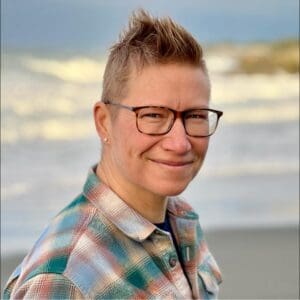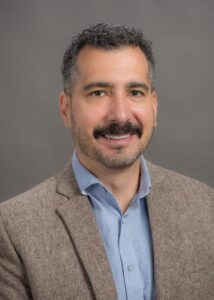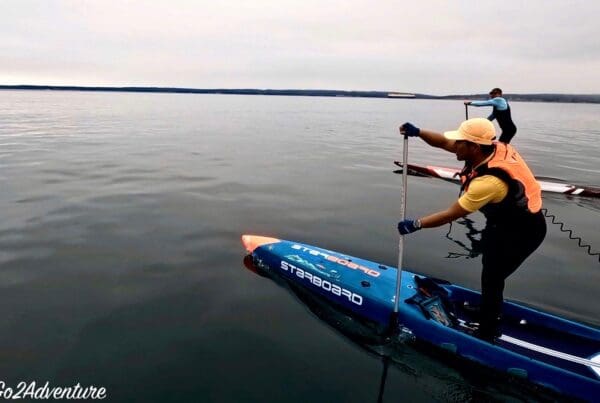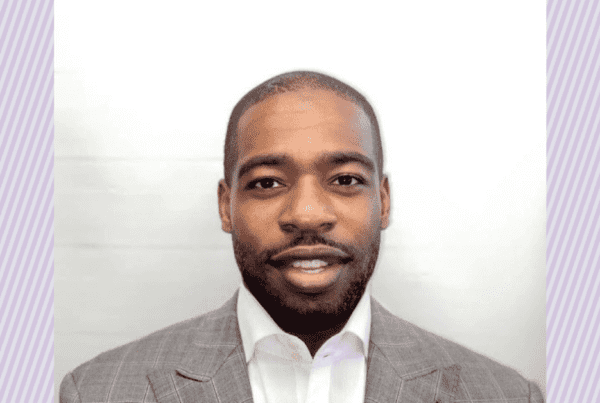Pride is a celebration, but it was also born from an uprising.
Understanding the history of Pride is important context into the LGBTQ+ experience, from the first Stonewall uprising decades ago to its impacts and influence on the LGBTQ+ experience today.
We spoke with some of our LGBTQ+ colleagues at UW Medicine to get their perspectives on what they want people to know about the LGBTQ+ community, how they define Pride, how allies can best support them and more.
What do you wish people knew about the LGBTQ+ community?
Matty Triplette, MD, MPH, (he/they), Pulmonary and Critical Care Medicine Specialist, Assistant Professor, Department of Medicine

“I think people often answer this question with ‘We are just like everyone else.’ While that’s true in a sense, I often think about the ways in which we are different, and in particular, how that enhances our roles as healthcare providers. Most people who identify as LGBTQ+ have been through some things in their life — be that rejection from families, peer groups or facing discrimination or hostility. But despite that, most of us are surviving and thriving. I think that gives us a lot of empathy for people who are facing challenges in their lives, which is often the case with our patients. I think our ability to be caring, empathetic and advocate — in this case for our patients — is our superpower.”
Skyli Parenteau (he/him/they/them), Administrative Assistant, Radiation Oncology
“I wish folks knew just how much of a community it truly is, and how positive involvement within it can be. People covered by the term LGBTQ+ can present themselves as out or proud as much or little as they would like, and they are able to choose to what degrees they do knowing that if they should need help, their community would have their back. There’s struggles within at times, like there are with any community, but overall, people are dedicated to making sure one another are safe. Being LGBTQ+ is not a choice. But there is choice within the community itself. How you choose to present who you are, who you choose to make into your ‘found family’ and how you choose to help your fellow person are choices people make every day. Your form of expression and participation are a choice, LGBTQ+ folks. Let nobody take that from you!”
Anne Browning, PhD, (she/her), Associate Dean for Well-Being, UW School of Medicine

“The LGBTQ+ community has tremendous diversity within it. I appreciate that the community is broadening a sense of who is a member and how folks can show up and be seen within the community.”
Fiona Unruh, (she/her), RN, Harborview Medical Center

“That we need you. This is not a month just for us to be seen and heard, it is a time for allies to join us. This is an opportunity to make our collective voices heard. We want you to be a part of this. When you join with us, you make us heard on a larger level. You can make us known in a way that supports us and gives us space to exist, by simply not being silent. Stand up with your LGBTQ+ friends and family.”
Phillip R., (he/him/his), CNA, medical assistant, and phlebotomist at Harborview Medical Center

“We don’t ask for anything more than living in peace and being seen as human beings who have the same rights as every other person on this planet to live and breathe. Don’t assume anything or judge anyone because of their looks and appearances. Be kind and listen to their story and you will understand their path, pain and sorrow they had to walk to get here.”
Gabriel Sarah, MD, (he/him/his), Associate Dean for Student Affairs and Assistant Professor, Anesthesiology and Pain Medicine

“The LGBTQ+ community is strong in the face of adversity, charitable when aware of need, loving when surrounded by hate. It’s comprised of individuals with their own stories, needs, desires, and intersectional identities — it is an assortment of unique people whose stories and experiences have been shaped by their navigation of life through struggle.”
How do you define Pride?
Matty Triplette
“I think of Pride as one of those last steps on the queer self-actualization pathway. Most of us spent periods in our youth wishing things were different, that we could be ‘normal’ and just be like everybody else. Pride is not just accepting that we are different but realizing that our queerness is an intrinsic part of who we are, acknowledging it as a gift, and being grateful and thankful for our differences.”
Skyli Parenteau
“Pride is the sense of inner peace and joy I feel having come into my own identity. There’s a communal pride where your heart soars when you see someone like you succeed or sinks when you see another is having a hard time. But equally important is the pride within yourself, that can be harder to come across. It’s the idea that I wake up sometimes and go ‘I am so thankful that I am able to not only accept, but enjoy, being my honest and true self.’”
Anne Browning
“Pride is about celebrating who you are. How that manifests depends a lot on our environments. For some – celebrating pride – who they are – can be a political and even dangerous act. Being able to be out and take up space within the world as a queer person is for me an intentional act to hold space for others to feel safe(r).”
Fiona Unruh
“Pride is a way for queer people to be visible. It is an opportunity for us to stand up and let people know we are here. It creates space for us in culture and society and it allows us to be visible to others who need the support and know that they are not alone.”
Gabriel Sarah
“I love the concept of Pride meaning resistance. Attacks on Pride often focus on the attire worn to pride, the presence of children in ‘adult spaces,’ or the concept of ‘over-sexualization.’ This is all noise and nonsense. Pride is love. Pride is acceptance. Pride is bolstering a community that has been attacked for simply existing. One that has lived under an unbearable allostatic load. Pride is resistance against a society that has told us we are not welcome and that we are less than. Lastly, Pride is compassion. Having compassion for others while also holding space to have compassion for yourself.”
What is the best way that someone can validate you in your queerness?
Matty Triplette
“I try to show up as my authentic self at work. I wear pins every day that express that I am a member of the queer community — and I largely do this so other staff and patients see that it is OK to be openly queer at work. I hope that this also serves as an invitation for my co-workers and patients to openly ask me about my life, my partner and my pronouns.”
Skyli Parenteau
“For personal reasons, I still present very feminine in my day-to-day, despite identifying as transmasc. The best way people can validate me is that despite the curves, the sweet voice, the bright pink hair, and the colorful skirts, people still call me he/him. I have they/them as a pronoun for people who have a hard time adjusting to he/him, and I try to be understanding in that respect. But to have someone acknowledge that my gender expression does not necessarily match my gender identity, and to respect both is phenomenal. As an important note for folks struggling to validate others: You will never be able to completely relate to every other person. Individual experiences vary, there’s a lot of places where identity intersects including gender, race, creed and more. What is important is this: ‘You do not have to understand each experience, but respect that it is someone’s.’ So, if someone asks you to use she/her, no matter how she presents, be sure to! It will make someone’s day.”
Anne Browning
“I don’t feel as though I look to others to validate my identities as gay or otherwise. But I appreciate feeling seen and acknowledged for how I move through the world.”
Fiona Unruh
“Treat me like I am the same as you. I’m a trans woman but more than that, I am a woman. I have a life that is full of things that are not defined by being trans. We are not that different.
Phillip R.
“For me as medical staff it is very important to be out at work, because working at Harborview and having a large population of LGBTQ+ patients coming in who need care is very comforting for them to see someone as part of their community, who understands their pronouns and boundaries. Some patients are scared to be out and be themselves due to fear or being judged or mistreated due to their sexual orientation, especially these days with what is going on with all the riots against our community. And me being out and always having a rainbow heart sticker on my badge is my way to give them hope, make them feel safe and not alone, and always show them that someone is there that can stand up for them.”
Gabriel Sarah
“Meeting people where they are, with love, kindness, and acceptance. Being perceived as different is an incredibly uncomfortable space to be in. Allowing everyone to be present as they are and honoring existence is the best way to validate someone’s queerness.”
What do you love most about the LGBTQ+ community?
Matty Triplette
“Being a part of a community that has achieved so much through community action. We have faced the HIV/AIDS epidemic and personal and systemic discrimination. However, we are thriving and surviving in all walks of life, and we’ve achieved so many victories over the last several decades. Right now, so much of the focus needs to be on people of color and our trans siblings who are facing mounting obstacles including a landmark amount of discriminatory legislation. I think our community has shown that we can and will fight for these folks — and I’m thankful to be a part of a community that is dedicated to not giving up this fight.”
Skyli Parenteau
“I love the feeling that I can give back. When not working for UW Medicine, I help a science fiction writing group filled with LGBTQ+ folks, many of them 16-23 years old. I love that we can communicate within our groups and even if every experience does not overlap, we can take what pain we’ve been given and use it to alleviate the next generation’s anxieties. I love seeing the relief in someone’s eyes when someone older who has experienced similar struggles can relate and can offer advice on how to help. I see very little desire within the LGBTQ+ community to perpetuate pain when we can perpetuate found family and love.”
Anne Browning
“Connecting across the differences in all of our identities, often facilitated by having some common sense or experience of the world as LGBTQ+ community members.”
Fiona Unruh
“The LGBTQ+ community is a family. It is more than just a group or a club. It is a family of people who have fought and still fight to exist. I am here because of those who came before me and those who are still fighting today for my rights, my freedom and my future. It shows me that I am not alone and that the challenges ahead are not for nothing. It lets me stand up today with confidence and willingness to be visible. I am part of a big welcoming family.”
Phillip R.

“When I came to Seattle from Romania, after I had quit after 10 years as a Romanian Orthodox priest, the LGBTQ+ community welcomed me and showed me the love I never had. The LGBTQ+ community is my chosen family, and I’m happy to be a member of it. As a matter of fact, I am a Drag Queen, and I am performing in any place I am invited to show my art and performance. It brings me closer to those new generations that are looking for guidance and motivation to come out of the shadows and be themselves. I’m known in LGBTQ+ community by my stage name as FyFy Sapphire.”
Gabriel Sarah
“I love the idea of having a chosen family. I love being part of a community that has the same lived experience as me. I love how creative and kind this community can be.”
How will you be celebrating pride this year?
Matty Triplette
“I’ll definitely make it down to the parade. I love to see folks from all over Seattle and the surrounding area just taking time to celebrate, because a lot of time has been spent fighting battles lately. I’ll also be spending a lot of time with my chosen family of loved ones. Usually, I come out of Pride weekend with a reaffirmed since of community and ready to face the challenges of the upcoming year.”
Skyli Parenteau
“I only moved to the Seattle area just before the pandemic hit, so I’m still learning how Pride is celebrated here in this area. So far, I’ve spent plenty of bonding time with my found family.”
Anne Browning
“Our tradition has been ice cream for breakfast and then joining in the festivities downtown.”
Fiona Unruh
“This may sound odd to some, but I’m celebrating by being alive. Parties and events are wonderful and needed, but more than that I am celebrating that I get to be me. In this way, every day is a celebration for me. Pride is an annual event for some people, but pride is my daily existence. As a trans woman, my existence has been up for debate in a lot of parts of the country and I’m celebrating that I live in Seattle and work at Harborview Medical Center. I live and work in a place where who I am is not questioned and I’m able to be myself. If I meet you in the halls of Harborview, you will know that I am celebrating daily, my own existence and the ability to truly be myself.”
Gabriel Sarah
“I try to celebrate pride every day, not just in June. Stop by my office and peruse some of the fun items I have that remind me how amazing this community is every day. The fight for acceptance and equality happens daily. We must always try to live as our most authentic selves.”



